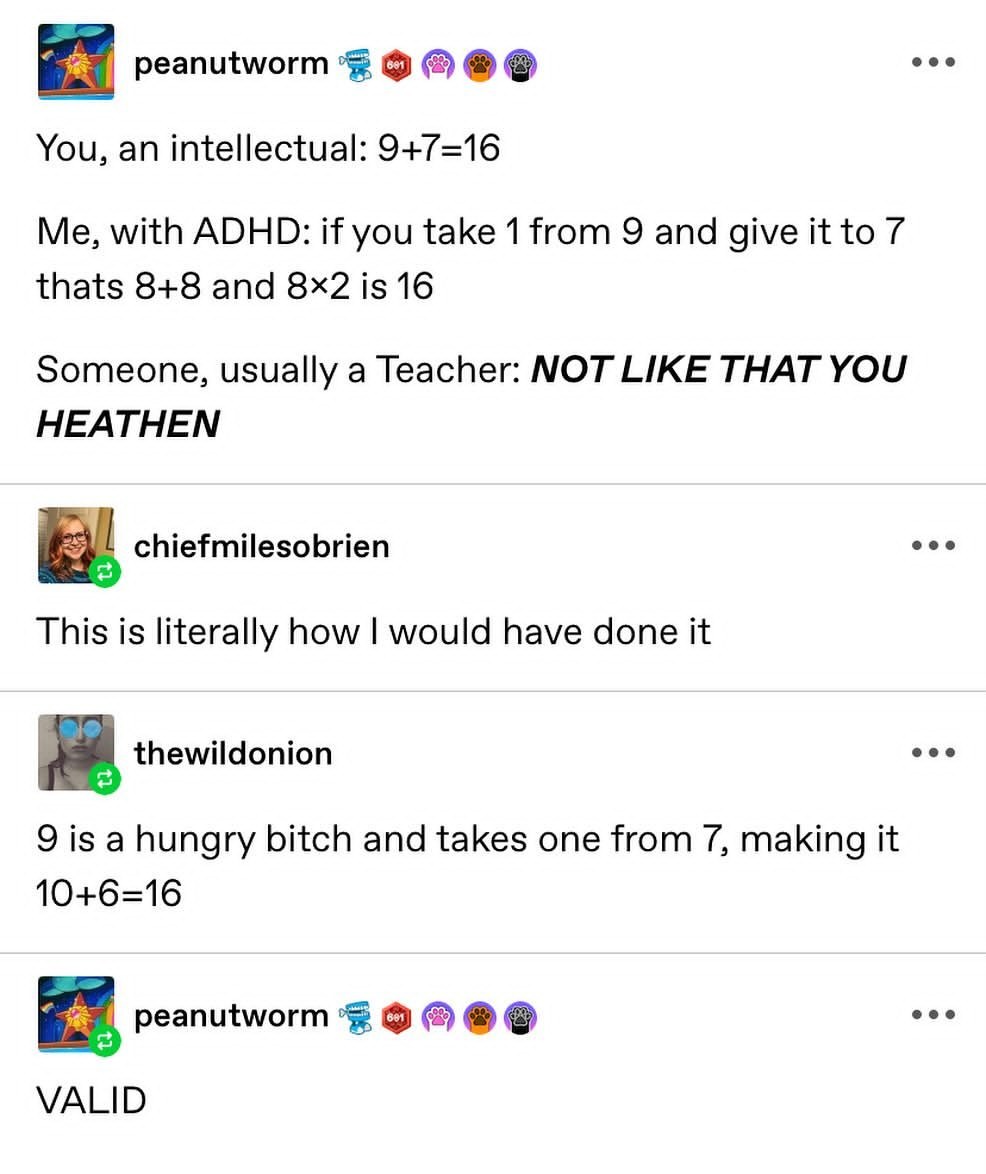7+9=7-(10-9)+10
Curated Tumblr
For preserving the least toxic and most culturally relevant Tumblr heritage posts.
Image descriptions and plain text captions of written content are expected of all screenshots. Here are some image text extractors (I looked these up quick and will gladly take FOSS recommendations):
-web
-iOS
Please begin copied raw text posts (lacking a screenshot that makes it apparent it is from Tumblr) with:
# This has been reposted here to Lemmy as part of the "Curated Tumblr Project."
I made the icon using multiple creative commons svg resources, the banner is this.
This picture just describes the 'new math' that everyone bemoans.
This kind of feels like how I constantly get the "which word/shape/number (etc.) in this series is incorrect" questions on tests wrong. I severely overthink it. "Well, these four all have chloroplasts and this other one gains energy from photosynthesis via a symbiotic relationship with another organism, so it must be that one."
*Gets test back*
"Oh, it was the one that didn't live in a rain forest."
Me, bad at math: yeah they taught us that as a way to do in grade school.
I think that third one down is actually how they’re teaching it at my kids’ schools now. It’s called “making a 10” I think, basically that same idea, add up to 10 first, then do the rest.
9+7=10+7-1=16
I like the way the second ADHD method is also a flip on the "seven ate nine" dad joke
I explained to a teacher one time this as my method, the get to ten version, and she looked confused as hell like why would anyone do that. She was cool with it though, gave me a whatever works for you kind of response.
Okay this is nice and all but how do people do 3974* 438 mentally, without paper? And bigger and some outright freaks seem to do it in an instant
Not any great easy way I can think of to do that one but I would attempt to do 400 by 3974 and then add chunks of 438 x 10 or x5 until I got really close and then add individual blocks.
So like 400 by 3974, you can round to 4000 and remove 4 x 26 = 104 after doubling 4000 twice. So we have 4000 to 8000 to 16000 remove 104 is 15896, add zeros is 1,589,600. Forget all other numbers but this one.
We are missing 38 x 3974. We can do the same round and remove trick to add 10 x 3974 by changing it to 10 x 4000 - 10 x 26. We need four of those though, so we can double it and turn from 40000 - 260 to 80000 - 520 and then 160,000 - 1040 or 158,960. Need to remove 2 x 3974 though, so remove 8000 and add 52 so 151,012.
Hopefully ive been able to keep that first number fresh in my head this whole time, which involves repeating it for me, and I'd add 1,589,600 and 151,012. Add 150000 and then 1,012 so 1,739,600 and then 1,740,612.
That all said, I make way more mistakes than a calculator, and I was off by 400 or so on my first run through. Also its really easy to forget big numbers like that for me. I'd say if you gave me ten of these to do mentally I'd get maybe 2 correct.
That's great but this is juggling numbers in memory and I simply cannot do this reliably. I will have this one current operation and put the other ones into the mental basket so to say and it evaporates and blurs as I calculate the other thing right so I wonder how these folks can do this and really fast. Not that I ever seriously tried other than some rare bored moments so maybe it is simply a matter of training?
Its very impressive though when you give these ppl two big numbers and they say result nearly in an instant
Over time those bigger numbers become more common too. Someone who can mentally do the type of problem I just did and get it right quickly likely have a ton of practice and will know quicker tricks, and be able to simplify it in a way.
Another part is they would be able to recognize a wrong answer more accurately as well. I didnt realize my answer was off by a lot until I put it in a calculator, but someone with more practice might know intuitively they were wrong.
I just don't consistently do this type of math, I used to be good at it in school but its become mostly irrelevant for me outside impressing someone a slight bit. It is helpful to have the ability to do things manually but it just rarely comes up.
